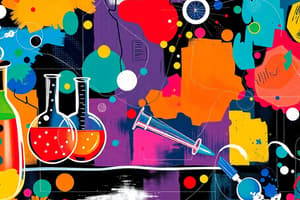Podcast
Questions and Answers
What is the role of an independent variable in an experiment?
What is the role of an independent variable in an experiment?
- It is the factor that is manipulated by the researcher. (correct)
- It is the factor being measured.
- It refers to factors kept constant.
- It is used to validate the results of a study.
Which of the following best describes qualitative data?
Which of the following best describes qualitative data?
- Data that does not require a sample size.
- Descriptive data based on observations. (correct)
- Data that can be expressed in a numerical form.
- Numerical data used for statistical analysis.
Why is randomization important in experiment design?
Why is randomization important in experiment design?
- It ensures that control variables are maintained.
- It allows for larger sample sizes.
- It reduces bias by evenly distributing variables. (correct)
- It guarantees the hypothesis will be proved.
What is the null hypothesis (H0) primarily used for?
What is the null hypothesis (H0) primarily used for?
Which statistical tool would you use to summarize data effectively?
Which statistical tool would you use to summarize data effectively?
What is the purpose of controls in an experiment?
What is the purpose of controls in an experiment?
How can you determine whether an experimental result is statistically significant?
How can you determine whether an experimental result is statistically significant?
What is a key characteristic that a hypothesis must have?
What is a key characteristic that a hypothesis must have?
What does replication in experiments help to achieve?
What does replication in experiments help to achieve?
Which statement best describes the role of sample size in experimental research?
Which statement best describes the role of sample size in experimental research?
Flashcards are hidden until you start studying
Study Notes
Scientific Method
Experiment Design
- Definition: Systematic approach to investigate phenomena.
- Components:
- Variables:
- Independent Variable: The factor manipulated by the researcher.
- Dependent Variable: The factor measured in response to changes.
- Control Variables: Factors kept constant to ensure a fair test.
- Sample Size: Larger sample sizes increase reliability and validity.
- Randomization: Reduces bias by randomly assigning subjects to different groups.
- Controls: Use of control groups to compare with experimental groups.
- Replication: Repeating experiments to verify results.
- Variables:
Data Analysis
- Purpose: To interpret collected data and draw conclusions.
- Types of Data:
- Qualitative Data: Descriptive data (e.g., observations).
- Quantitative Data: Numerical data (e.g., measurements).
- Statistical Tools:
- Descriptive Statistics: Summarize data (mean, median, mode).
- Inferential Statistics: Generalize findings (t-tests, ANOVA).
- Visualization: Graphs and charts (bar graphs, line graphs, scatter plots) for easier interpretation.
- Error Analysis: Identify and quantify errors (random vs. systematic errors).
Hypothesis Formulation
- Definition: A testable prediction about the relationship between variables.
- Characteristics:
- Specific: Clearly defines the variables involved.
- Testable: Must be empirically investigated.
- Falsifiable: Must be able to be proven wrong.
- Types of Hypotheses:
- Null Hypothesis (H0): Assumes no effect or relationship.
- Alternative Hypothesis (H1): Assumes some effect or relationship exists.
- Developing Hypotheses:
- Based on observations, prior research, or theoretical frameworks.
- Use of "if...then..." statements to express predictions.
Experiment Design
- Systematic approach aimed at investigating scientific phenomena.
- Variables:
- Independent Variable: The factor that researchers manipulate.
- Dependent Variable: The factor that is measured in response to the independent variable's changes.
- Control Variables: Factors kept constant to ensure experiments are fair and unbiased.
- Sample Size: A larger sample enhances the reliability and validity of findings.
- Randomization: A method to minimize bias by randomly assigning subjects to different experimental groups.
- Controls: Control groups serve as a baseline for comparison against experimental groups.
- Replication: Involves repeating experiments to confirm results and their consistency.
Data Analysis
- Aimed at interpreting data to draw valid conclusions from experiments.
- Types of Data:
- Qualitative Data: Includes descriptive elements like observations.
- Quantitative Data: Consists of measurable numerical data (e.g., lengths, weights).
- Statistical Tools:
- Descriptive Statistics: Summarize data using measures such as mean, median, and mode.
- Inferential Statistics: Allow for generalizations beyond the sample using techniques like t-tests and ANOVA.
- Visualization: Use of graphs and charts (e.g., bar graphs, line graphs, scatter plots) to help in understanding data trends and patterns.
- Error Analysis: Critical for identifying (random vs. systematic) errors that can affect the validity of results.
Hypothesis Formulation
- Describes a testable prediction regarding the relationship between variables being studied.
- Characteristics:
- Specific: Defines clear variables and their expected interactions.
- Testable: Hypotheses must be subject to empirical investigation.
- Falsifiable: Must be structured in a way that allows them to be proven wrong.
- Types of Hypotheses:
- Null Hypothesis (H0): Postulates that no effect or relationship exists between variables.
- Alternative Hypothesis (H1): Postulates that an effect or relationship does exist.
- Developing Hypotheses:
- Formulated based on observations, previous research, or theoretical foundations.
- Often expressed using "if...then..." statements to articulate predictions clearly.
Studying That Suits You
Use AI to generate personalized quizzes and flashcards to suit your learning preferences.




